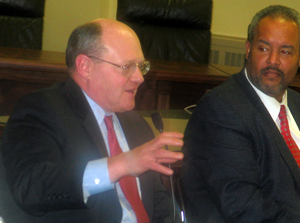 |
From left: Glenn Fosdick, president and CEO of The Nebraska Medical Center, speaks at a recent seminar for state senators about Nebraska health care policy as Rubens Pamies, M.D., UNMC vice chancellor for academic affairs, looks on. |
This is especially true this session, during which the Legislature will welcome 22 new state senators, one of the largest influxes of new blood into the unicameral in recent memory.
The University of Nebraska recently hosted three policy seminars designed to help new and experienced legislators anticipate and understand issues they may face. The seminar topics focused on water, criminal justice and health care policy. UNMC designed and conducted the seminar on health care policy.
“We want legislators to have the information they need as they prepare to craft the state’s health care policy,” UNMC Vice Chancellor for External Affairs Bob Bartee said.
Leading the health policy session was a panel composed of Susan Boust, M.D., UNMC associate professor of psychiatry; Glenn Fosdick, president and CEO of The Nebraska Medical Center; Rubens Pamies, M.D., UNMC vice chancellor for academic affairs; Joann Schaefer, M.D., Nebraska’s chief medical officer; Keith Mueller, Ph.D., director of the Rural Policy Institute at UNMC; Cory Shaw, chief administrative officer of UNMC Physicians; and Jeffery Santema, counsel to the Legislature’s Health and Human Services Committee. Bartee moderated the discussion.
Among the issues legislators may encounter during the session include a lack of medical professionals in rural parts of the state, the panelists said.
“We have an aging and shrinking population in much of our state,” Shaw said. “It is a challenge to attract health care professionals to these areas. But it’s a challenge we have to deal with.”
Dr. Boust and Fosdick urged lawmakers to look at new ways to leverage federal funds to help the state’s health care system.
Lawmakers also will be faced with trying to set a policy that improves health care access for some of Nebraska’s underserved communities, Dr. Pamies said.
“The need to improve health care accessibility for people in underserved areas is pressing,” Dr. Pamies said.
Obesity is another issue that new lawmakers will likely be confronted with, Dr. Schaefer said.
“The fact that our children have shorter life expectancies than we do because of obesity is a profoundly sad commentary on our current situation,” Dr. Schaefer said.
The state will likely have to look at what it can do to stem this problem, particularly among Nebraska’s young people, Dr. Schaefer said.
Panelists also discussed small-business health insurance and setting up a system that connects the state’s health institutions and allows valuable patient information to be shared quickly.
The discussion was an opportunity to introduce UNMC as a resource for lawmakers, Bartee said.
“UNMC and its faculty are valuable assets to lawmakers as they develop the state’s health care policy,” Bartee said. “From our ability to help implement policy to our expertise in helping to craft legislation, we have many people who could provide tremendous insight and support for lawmakers.”
Dave Pankonin, senator-elect from District 2 in Cass County, attended the forum and said it was informative and should serve him well as he prepares for his first session in the unicameral.
Pankonin’s comments were echoed by Senator-elect Norman Wallman of District 30, who said the panelists provided valuable insight into the issues he and his fellow freshman lawmakers will face when the session kicks off.